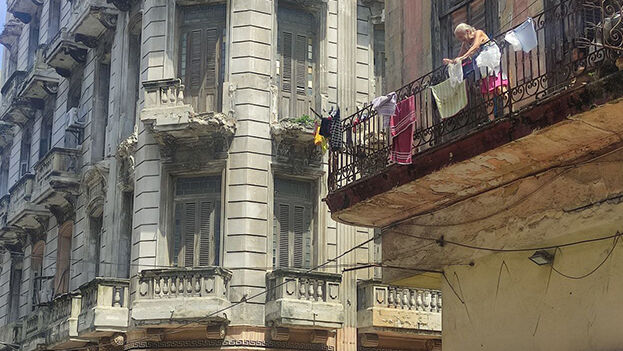
![]() 14ymedio, Yoani Sánchez, Generation Y, Havana, 18 June 2022 — A German academic was especially happy when his friends came to visit and he was able to give them an insightful tour of Berlin. The history of the gradual loss of the balconies suffered by the area of the city that had come under communist control after the Second World War was never missing in those journeys. The impact of the bombs during the conflict, the tendency to wall up those parts of the building instead of rebuilding them when peace came, and a socialist architecture more oriented towards the practical than the beautiful, led to the “de-balconization” of the GDR capital.
14ymedio, Yoani Sánchez, Generation Y, Havana, 18 June 2022 — A German academic was especially happy when his friends came to visit and he was able to give them an insightful tour of Berlin. The history of the gradual loss of the balconies suffered by the area of the city that had come under communist control after the Second World War was never missing in those journeys. The impact of the bombs during the conflict, the tendency to wall up those parts of the building instead of rebuilding them when peace came, and a socialist architecture more oriented towards the practical than the beautiful, led to the “de-balconization” of the GDR capital.
After recounting everything that happened in great detail, the German professor pronounced that peculiar concept in his own language. After a breath, he began to detail how after the fall of the Berlin Wall the reverse process began, the “re-balconization” of the city. At that moment, he made a stop and confirmed that it was only when he explained that architectural detail of his country’s history that he could use that word. On no other occasion did that term pass his hips, hence he was doubly grateful to his patient listeners for the opportunity to shake up his vocabulary.
Unlike the German city, the de-balconization that Havana has been suffering has not been due to the projectiles of war. Laziness, lack of maintenance and the material indigence of the owners of many buildings have caused this architectural element to be lost between collapses, cracks and shoring. It is becoming more and more common to see facades with exposed pieces of steel that once supported a beautiful terrace projecting outwards.

But missing are not only the hundreds (perhaps thousands) of balconies that have fallen onto the streets, and onto the heads of passers-by or the lower floor apartments, but many others are closed or never used due to the inhabitants’ fear that they will collapse if someone peeks out through them. What was once an element of entertainment and pleasure for the dwellers of the home and a treat for the eyes of pedestrians, is now a cause for widespread panic. People fear these vantage points pierced by cracks, moisture and mold.
The Cuban capital has lost its balconies, but it has also been losing its cornices and the flowery capitals of many columns. In streets where before you could walk without leaving the covered portals, now the route is interrupted by the collapse of the roofs that force you to get off the sidewalk and continue on a zigzagging route. To this we must add that most of the buildings that were built during the Soviet subsidy period dispensed with that detail so important in a tropical country, a balcony. Gray walls, small windows and not even an area to hang clothes is the harsh reality experienced in most of these post-Revolution concrete blocks.
I dream of the day when my academic friend visits Havana again and this whole nightmare of deterioration is just a bad memory from the past. I will surely explain to him how democracy not only meant being able to say what you think without being punished, but also promoted the construction of houses, attracting back to the country so many talented émigré architects who designed cooler houses that take better advantage of the maritime breeze, and at the same time do not make their inhabitants feel as if they were locked in a matchbox. At that moment, I am going to enjoy telling him that the re-balconization of the city where I was born has already begun. It will possibly be one of the few times that I will be able to pronounce that word.
____________
COLLABORATE WITH OUR WORK: The 14ymedio team is committed to practicing serious journalism that reflects Cuba’s reality in all its depth. Thank you for joining us on this long journey. We invite you to continue supporting us by becoming a member of 14ymedio now. Together we can continue transforming journalism in Cuba.
